Fleurs du Mal Magazine


Or see the index
Gedichtendag 2017 (26 januari)

Poëzieweek 2017 (26 januari t/m/ 1 februari)
 Opening Poëzieweek 2017 (26 januari t/m/ 1 februari)
Opening Poëzieweek 2017 (26 januari t/m/ 1 februari)
Met Gedichtendag gaat op de laatste donderdag van januari traditiegetrouw de Poëzieweek van start. Gedichtendag, sinds 2000 georganiseerd door Poetry International Rotterdam, is hét poëziefeest van Nederland en Vlaanderen. Poëzieliefhebbers in Nederland en Vlaanderen organiseren die dag een grote diversiteit aan eigen poëzieactiviteiten en ook de media klinken die dag een stuk poëtischer.
Voor de enorme hoeveelheid optredens, publicaties, poëzieprijzen, -programma’s en -activiteiten is één dag simpelweg veel te kort!
Verspreid poëzie op social media
Breng poëzie in uw leven! Laat u inspireren door de foto-gedichten en deel het op social media met #Gedichtendag. Wijs vrienden en contacten op website poezieweek.com
Lees ook poëzie op website: fleursdumal.nl magazine
Dicht mee!
More in: #Archive A-Z Sound Poetry, Art & Literature News, CLASSIC POETRY, CONCRETE , VISUAL & SOUND POETRY, EDITOR'S CHOICE, EXPERIMENTAL POETRY, LIGHT VERSE, Literary Events, MODERN POETRY, POETRY ARCHIVE, Poëzieweek, PRESS & PUBLISHING, STREET POETRY, The talk of the town
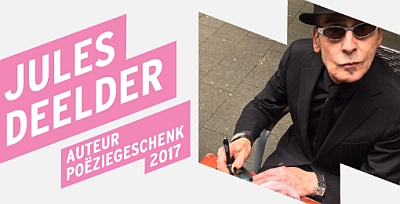
Humor en poëzie? ”Jawel”, zegt Jules Deelder (Rotterdam-Overschie, 1944), die het Poëziegeschenk 2017 zal schrijven. Met het thema humor in de Poëzieweek 2017 komt er aandacht voor gedichten die op de lachspieren werken, uit hilariteit, herkenbaarheid of uit ironie. Humor is in Deelders poëzie in ieder geval geen curiosum. Deze Nederlandse dichter van een omvangrijk oeuvre staat in binnen- en buitenland bekend om zijn memorabele performances, waarbij de Beat Generation nooit veraf lijkt.
Aan de vooravond van de Poëzieweek wordt in Nederland voor de 23ste keer de VSB Poëzieprijs uitgereikt en in Vlaanderen de Herman de Coninckprijs. De Poëzieweek start op donderdag 26 januari in Vlaanderen en Nederland met Gedichtendag en loopt t/m woensdag 1 februari; de prijsuitreiking van de Turing Gedichtenwedstrijd. Tijdens de Poëzieweek krijgen de klanten van de boekhandel bij aankoop van € 12,50 aan poëzie het Poëziegeschenk cadeau.
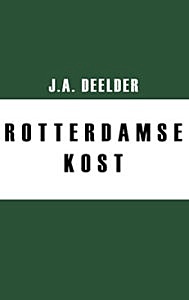 Gedichten worden in onze contreien eerder met ernst dan met humor geassocieerd. Het verdriet is eindeloos en de liefde hopeloos. Toch wordt er ook heel wat afgelachen in poëtenland. Soms is er de luide bulderlach bij een kolderiek nonsensgedicht, vaak is er ook een grijns van herkenning. De verwarrende situatie die de dichter beschrijft, hebben we zelf allemaal ook meegemaakt. Humor in poëzie kan ook wat ongemakkelijk zijn: valt hier wel om te lachen? Dichters gebruiken humor ook in de vorm van ironie of spot om een maatschappelijke wantoestand aan te klagen. Humor is bovenal een manier om met de meerduidigheid van de dingen om te gaan en dat is bij poëzie niet anders…
Gedichten worden in onze contreien eerder met ernst dan met humor geassocieerd. Het verdriet is eindeloos en de liefde hopeloos. Toch wordt er ook heel wat afgelachen in poëtenland. Soms is er de luide bulderlach bij een kolderiek nonsensgedicht, vaak is er ook een grijns van herkenning. De verwarrende situatie die de dichter beschrijft, hebben we zelf allemaal ook meegemaakt. Humor in poëzie kan ook wat ongemakkelijk zijn: valt hier wel om te lachen? Dichters gebruiken humor ook in de vorm van ironie of spot om een maatschappelijke wantoestand aan te klagen. Humor is bovenal een manier om met de meerduidigheid van de dingen om te gaan en dat is bij poëzie niet anders…
J.A. Deelder zette zijn eerste stappen in zijn carrière als performer in 1966. Na zijn poëziedebuut Gloria Satoria bij De Bezige Bij volgden nog vele bundels met als meest recente publicaties Tussentijds (2008), Ruisch (2011), Het graf van Descartes (2013) en Dag en nacht (2014). In zijn vaak absurdistische, maar steeds glasheldere poëzie wordt de jazz haast tastbaar. De onderwerpen die Deelder aansnijdt zijn de Tweede Wereldoorlog, Duitsland, Rotterdam, jazz en het leven van Deelder zelf. In 1982 debuteerde Deelder als prozaïst met Schöne Welt. Hierna verschenen een groot aantal verhalenbundels en gelegenheidsuitgaven waaronder Deelderama (2001), Swingkoning (2006) en Deelder lacht (2007). Deelder ontving voor zijn gehele oeuvre de Anna Blaman Prijs (1988), de Johnny Van Doorn-prijs voor de gesproken letteren (1999), en de Tollensprijs (2005). In 2005 mocht hij ook een Edison voor zijn cd Deelder blijft draaien in ontvangst nemen. 
De Poëzieweek is een Nederlands-Vlaamse samenwerking van Stichting Poetry International, Poëziecentrum, Iedereen Leest Vlaanderen, Stichting Lezen Nederland, Awater, Poëzieclub, Het Literatuurhuis, Wintertuin, SLAG, Taalunie, SSS, het Nederlands Letterenfonds, Vlaams Fonds voor de Letteren, Turing Foundation, VSBfonds, Boek.be en de CPNB. Met de bundeling van deze activiteiten willen de organisatoren een groter bereik creëren voor poëzie.
fleursdumal.nl magazine
More in: Archive C-D, Art & Literature News, Jules Deelder, LIGHT VERSE, Literary Events, Poëzieweek
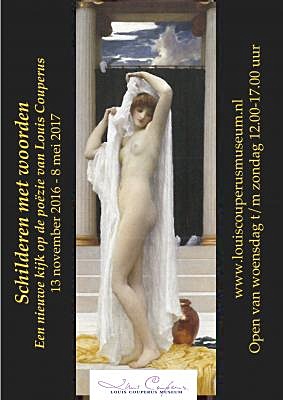 Nieuwe tentoonstelling Schilderen met woorden. Een nieuwe kijk op de poëzie van Louis Couperus. 13 november 2016 – 8 mei 2017 in het Louis Couperus Museum.
Nieuwe tentoonstelling Schilderen met woorden. Een nieuwe kijk op de poëzie van Louis Couperus. 13 november 2016 – 8 mei 2017 in het Louis Couperus Museum.
Gedurende een groot deel van zijn leven (om precies te zijn 25 jaar) heeft Louis Couperus poëzie geschreven. Tot nu toe is er te weinig aandacht geschonken aan dit onderwerp.
Deze winter visualiseert het Louis Couperus Museum de dichtkunst van de Haagse schrijver door middel van afbeeldingen en beeldhouwwerk waardoor de schrijver was geïnspireerd.
Tentoonstelling
Aan de wanden worden representatieve gedichten of citaten daaruit groot weer gegeven, op textiel afgedrukt. Bij elk fragment komt een afbeelding te hangen die inhoudelijk in verband staat met het betreffende gedicht. Reproducties van schilderijen – in een enkel geval zelfs een beeldhouwwerk – hebben Couperus soms regelrecht tot voorbeeld gediend. Ook de doorwerking van zijn poëzie in zijn proza komt aan bod. Op de televisiemonitor is een voordracht van zijn dichtkunst door acteur Joop Keesmaat te zien en te horen.
De expositie is gecentreerd rond 5 thema’s uit Couperus’ poëzie. Allereerst de figuur van Petrarca die hem de Laura-cyclus in gaf. Ten tweede de salon-schilderkunst uit de negentiende eeuw en daarmee samenhangend gedichten waarin Couperus bijna letterlijk ‘met woorden schildert’. Vervolgens het beeld Alba van de Friese beeldhouwer Pier Pander, dat Couperus in het gelijknamige sonnet bezong. Dan de wereld van de Arthurlegenden die hem zo boeide, en de door Italië geïnspireerde gedichten. De ‘aardse Couperus’ (Arjan Peters) komt in de ‘sonnettenroman’ Endymion aan bod. Hierin vereenzelvigt Couperus zich met een volksjongen die in de klassieke metropool Alexandrië allerlei avonturen beleeft. Dit wordt op eigentijdse wijze gevisualiseerd door een stripverhaal van de hand van Mees Arnzt, een student van de Koninklijke Academie voor Beeldende Kunsten.
Verantwoording
De tentoonstelling wordt ingericht door gastconservator Frans van der Linden, medewerker van het Louis Couperus Museum, winnaar van de Couperuspenning en samensteller van het boekje O gouden, stralenshelle fantazie! Bloemlezing uit de poëzie van Louis Couperus (in de Prominentreeks van Uitgeverij Tiem, 2015).
De expositie wordt mede mogelijk gemaakt dankzij een bijdrage van het Prins Bernhard Cultuurfonds.
schilderen met woorden.
een nieuwe kijk op de poëzie van Couperus
13 november 2016 – 8 mei 2017
Louis Couperus Museum
Javastraat 17
2585 AB Den Haag
070-3640653
info@louiscouperusmuseum.nl
Openingstijden
Woensdag t/m zondag 12.00-17.00 uur
Voor groepen ook op afspraak
Het gehele jaar door geopend, met uitzondering van 1ste en 2de Kerstdag en Nieuwjaarsdag
Toegankelijk voor gehandicapten
# Meer informatie op website van het Couperus Museum
fleursdumal.nl magazine
More in: Archive C-D, Archive C-D, Art & Literature News, DICTIONARY OF IDEAS, Literary Events, Louis Couperus, Museum of Literary Treasures
 Ben jij het poëzietalent van het jaar 2017?
Ben jij het poëzietalent van het jaar 2017?
Jouw gedicht in een dichtbundel? Dat kan! Doe mee aan de dichtwedstrijd Doe Maar Dicht Maar. Je hoeft geen doorgewinterd dichter te zijn om mee te doen. Je hoeft ook geen ‘klassiek’ gedicht te schrijven; een rap of een songtekst mag ook! Laat dus vooral je fantasie de vrije loop.
Poëziepaleis zoekt talent!
Kun jij goed schrijven? Ben jij creatief met woorden en heb je gevoel voor dichten, rappen of songteksten schrijven? Doe dan gauw mee met de dichtwedstrijd Doe Maar Dicht Maar. De honderd beste gedichten winnen een plekje in een mooie dichtbundel!
Hoe kun je meedoen?
Stuur voor 5 februari 2017 maximaal 3 gedichten in van elk maximaal 24 regels via het wedstrijdformulier. Vanzelfsprekend schrijf jij deze gedichten zelf; plagiaat is verboden! Omdat er duizenden gedichten worden ingestuurd, krijgen alleen de honderd winnaars begin mei 2016 bericht. De uitslag komt half mei op de website te staan.
 Wanneer mag je meedoen?
Wanneer mag je meedoen?
– Je bent 12 t/m 18 jaar;
– Je spreekt en schrijft Nederlands;
– Je zit op het VMBO/ Havo/ VWO/ ROC of MBO;
– Je zit op de eerste t/m de derde graad van het secundair onderwijs in België.
Wat kun je winnen?
Van de duizenden inzendingen worden 100 gedichten gekozen die een plekje in de dichtbundel Doe Maar Dicht Maar 2015/2016 krijgen. De tien allerbeste dichters, vijf winnaars uit de leeftijdscategorie 12 t/m 14 jaar en vijf winnaars uit de leeftijdscategorie 15 t/m 18 jaar, krijgen een uniek cadeau met hun gedicht erop. De winnaars uit deze categorieën winnen een hoofdprijs!
Wil je tips voor het schrijven van gedichten? Neem dan een kijkje bij Tips & Inspiratie.
# Meer te vinden op de website van het poëziepaleis
fleursdumal.nl magazine
More in: - Book Lovers, Art & Literature News, Children's Poetry, MODERN POETRY, POETRY ARCHIVE
 Kinderen en poëzie 2017
Kinderen en poëzie 2017
Kinderen en Poëzie is een landelijke dichtwedstrijd voor kinderen van 6 t/m 12 jaar die het leuk vinden om gedichten te schrijven. Je kunt deelnemen via school, maar je kunt ook thuis of op de BSO een gedicht schrijven en dat insturen. Vul het wedstrijdformulier in of stuur je gedicht per post. Vraag je ouders, juf of meester om je te helpen als je het niet snapt.
Wanneer mag je meedoen?
– Als je 6 t/m 12 jaar oud bent;
– Als je in groep 3 t/m 8 van de basisschool zit;
– Als je op het speciaal onderwijs zit; je mag dan zelfs meedoen als je ouder bent dan 12. Geef dit dan aan bij opmerkingen op het wedstrijdformulier.
Hoe kun je meedoen?
Stuur voor 5 februari 2017 maximaal drie zelfbedachte gedichten in. Gedichten in braille, een groepsgedicht of een gedicht in een andere taal (stuur wel even een vertaling mee) zijn ook welkom. Alles wat je maar wilt, zolang het maar zelfverzonnen en -geschreven is!
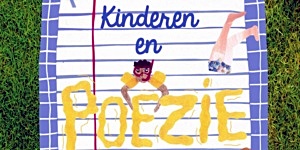 Wanneer mag je meedoen?
Wanneer mag je meedoen?
– Als je 6 t/m 12 jaar oud bent;
– Als je in groep 3 t/m 8 van de basisschool zit;
– Als je op het speciaal onderwijs zit; je mag dan zelfs meedoen als je ouder bent dan 12. Geef dit dan aan bij opmerkingen op het wedstrijdformulier.
Wat kun je winnen?
Als je meedoet aan de wedstrijd kun je leuke prijzen winnen, waaronder een plekje in een echte dichtbundel. Je maakt ook kans op één van de twee hoofdprijzen. Er is een hoofdprijs voor de middenbouw en een hoofdprijs voor de bovenbouw. Daarnaast is er ook nog een speciale prijs van de Kinderjury. Genoeg redenen om mee te doen dus!
Poëziepaleis zoekt talent!
Kinderen van 6 t/m 12 jaar
Wil je tips voor het schrijven van gedichten? Neem dan een kijkje bij tips & Inspiratie.
# Meer informatie op website poëziepaleis
fleursdumal.nl magazine
More in: - Book Lovers, Art & Literature News, Children's Poetry, MODERN POETRY
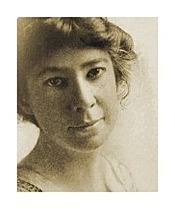
Sara Teasdale
(1884 – 1933)
“Only in Sleep”
Only in sleep I see their faces,
Children I played with when I was a child,
Louise comes back with her brown hair braided,
Annie with ringlets warm and wild.
Only in sleep Time is forgotten—
What may have come to them, who can know?
Yet we played last night as long ago,
And the doll-house stood at the turn of the stair.
The years had not sharpened their smooth round faces,
I met their eyes and found them mild—
Do they, too, dream of me, I wonder,
And for them am I too a child?
Sara Teasdale
fleursdumal.nl magazine
More in: Archive S-T, Teasdale, Sara
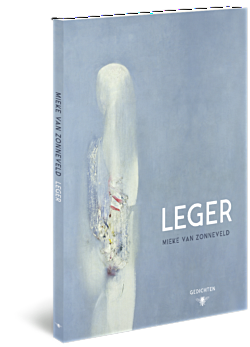 De salon van zaterdag 28 januari 2017 staat in het teken van Mieke van Zonneveld; zij presenteert haar debuutbundel ‘Leger’, uitgegeven door De Bezige Bij, en draagt eruit voor. Het programma brengt dichters die haar inspireren uit het heden en verleden, afgewisseld door passende muziek. Roland Holstprijswinnaar en voormalige stadsdichter van Amsterdam Menno Wigman draagt voor uit o.a. zijn laatste bundel ‘Slordig met geluk’. Simon Mulder draagt voor uit favoriete werken van J. H. Leopold.
De salon van zaterdag 28 januari 2017 staat in het teken van Mieke van Zonneveld; zij presenteert haar debuutbundel ‘Leger’, uitgegeven door De Bezige Bij, en draagt eruit voor. Het programma brengt dichters die haar inspireren uit het heden en verleden, afgewisseld door passende muziek. Roland Holstprijswinnaar en voormalige stadsdichter van Amsterdam Menno Wigman draagt voor uit o.a. zijn laatste bundel ‘Slordig met geluk’. Simon Mulder draagt voor uit favoriete werken van J. H. Leopold.
Presentatie debuut Mieke van Zonneveld met Menno Wigman
Op zaterdagavond 28 januari presenteert het Feest der Poëzie de dichter Mieke van Zonneveld met haar bundel ‘Leger’, uitgegeven door De Bezige Bij. Het programma vindt plaats in de prachtige omgeving van het Pianola Museum te Amsterdam. Naast een voordracht van Mieke van Zonneveld uit de nieuwe bundel, zal ook Menno Wigman, voormalig stadsdichter van Amsterdam en winnaar van de A. Roland Holstprijs, voordragen. Ook zijn er gedichten van J. H. Leopold en een pianorecital van Henk van Zonneveld.
Tevens vindt op 18 februari de akoestische reprise van Project Diepenbrock, onze voorstelling tijdens het Feest der Poëzie van 2014, plaats, met chansontrio En Vrac, Mieke van Zonneveld en Simon Mulder.
Praktische informatie
Datum: zaterdag 28 januari 2017
Tijd: zaal open: 20 uur, aanvang: 20:30 uur
Locatie: Pianola Museum, Westerstraat 106, Amsterdam
Reserveren via info@pianola.nl wordt zeer aangeraden.
Meer informatie: www.feestderpoezie.nl onder ‘Salon der Verzen’
Mieke van Zonneveld (1989) – lid van collectief het Feest der Poëzie sinds het begin in 2008 – studeerde Nederlands en oudheidkunde aan de Vrije Universiteit en rondt momenteel haar onderzoeksmaster letterkunde af. Ze won in 2014 de landelijke Turing Gedichtenwedstrijd. Zij debuteert met een klassiek aandoende bundel over liefde en vriendschap, over ziekte en geloof. Leger is een gemystificeerd en genadeloos zelfonderzoek van een jonge dichter die de dood in de ogen heeft gekeken. Uitgeverij is Bezige Bij.
Mieke van Zonneveld debuteert met een klassiek aandoende bundel over liefde en vriendschap, over ziekte en geloof. Haar poëzie wekt de indruk van volledige helderheid, maar ze versluiert tegelijk. De eenvoud van woorden roept een grootsheid van beelden op waaronder telkens het risico sluimert uit het volle leven geknipt te worden. Slechts in dromen bestaat de mogelijkheid barrières te beslechten. Leger is een gemystificeerd en genadeloos zelfonderzoek van een jonge dichter die de dood in de ogen heeft gekeken.
Mieke van Zonneveld publiceerde enkele gedichten in voormalig literair tijdschrift De tweede ronde en in het ambachtelijk gedrukte Avantgaerde. Als lid van het Feest der Poëzie treedt ze af en toe op tijdens literaire salons. Ze is bezig met haar masteronderzoek Letterkunde aan de Vrije Universiteit Amsterdam.
# Meer informatie op website feestderpoezie
fleursdumal.nl magazine
More in: - Book News, Archive Y-Z, Art & Literature News, City Poets / Stadsdichters, Feest der Poëzie, Leopold, J.H., Literary Events, MODERN POETRY, MUSIC, Wigman, Menno
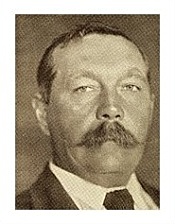 A Physiologist’s Wife
A Physiologist’s Wife
by Arthur Conan Doyle
Professor Ainslie Grey had not come down to breakfast at the usual hour. The presentation chiming-clock which stood between the terra-cotta busts of Claude Bernard and of John Hunter upon the dining-room mantelpiece had rung out the half-hour and the three-quarters. Now its golden hand was verging upon the nine, and yet there were no signs of the master of the house.
It was an unprecedented occurrence. During the twelve years that she had kept house for him, his youngest sister had never known him a second behind his time. She sat now in front of the high silver coffee-pot, uncertain whether to order the gong to be resounded or to wait on in silence. Either course might be a mistake. Her brother was not a man who permitted mistakes.
Miss Ainslie Grey was rather above the middle height, thin, with peering, puckered eyes, and the rounded shoulders which mark the bookish woman. Her face was long and spare, flecked with colour above the cheek-bones, with a reasonable, thoughtful forehead, and a dash of absolute obstinacy in her thin lips and prominent chin. Snow white cuffs and collar, with a plain dark dress, cut with almost Quaker-like simplicity, bespoke the primness of her taste. An ebony cross hung over her flattened chest. She sat very upright in her chair, listening with raised eyebrows, and swinging her eye-glasses backwards and forwards with a nervous gesture which was peculiar to her.
Suddenly she gave a sharp, satisfied jerk of the head, and began to pour out the coffee. From outside there came the dull thudding sound of heavy feet upon thick carpet. The door swung open, and the Professor entered with a quick, nervous step. He nodded to his sister, and seating himself at the other side of the table, began to open the small pile of letters which lay beside his plate.
Professor Ainslie Grey was at that time forty-three years of age—nearly twelve years older than his sister. His career had been a brilliant one. At Edinburgh, at Cambridge, and at Vienna he had laid the foundations of his great reputation, both in physiology and in zoology.
His pamphlet, On the Mesoblastic Origin of Excitomotor Nerve Roots, had won him his fellowship of the Royal Society; and his researches, Upon the Nature of Bathybius, with some Remarks upon Lithococci, had been translated into at least three European languages. He had been referred to by one of the greatest living authorities as being the very type and embodiment of all that was best in modern science. No wonder, then, that when the commercial city of Birchespool decided to create a medical school, they were only too glad to confer the chair of physiology upon Mr. Ainslie Grey. They valued him the more from the conviction that their class was only one step in his upward journey, and that the first vacancy would remove him to some more illustrious seat of learning.
In person he was not unlike his sister. The same eyes, the same contour, the same intellectual forehead. His lips, however, were firmer, and his long, thin, lower jaw was sharper and more decided. He ran his finger and thumb down it from time to time, as he glanced over his letters.
“Those maids are very noisy,” he remarked, as a clack of tongues sounded in the distance.
“It is Sarah,” said his sister; “I shall speak about it.”
She had handed over his coffee-cup, and was sipping at her own, glancing furtively through her narrowed lids at the austere face of her brother.
“The first great advance of the human race,” said the Professor, “was when, by the development of their left frontal convolutions, they attained the power of speech. Their second advance was when they learned to control that power. Woman has not yet attained the second stage.”
He half closed his eyes as he spoke, and thrust his chin forward, but as he ceased he had a trick of suddenly opening both eyes very wide and staring sternly at his interlocutor.
“I am not garrulous, John,” said his sister.
“No, Ada; in many respects you approach the superior or male type.”
The Professor bowed over his egg with the manner of one who utters a courtly compliment; but the lady pouted, and gave an impatient little shrug of her shoulders.
“You were late this morning, John,” she remarked, after a pause.
“Yes, Ada; I slept badly. Some little cerebral congestion, no doubt due to over-stimulation of the centers of thought. I have been a little disturbed in my mind.”
His sister stared across at him in astonishment. The Professor’s mental processes had hitherto been as regular as his habits. Twelve years’ continual intercourse had taught her that he lived in a serene and rarefied atmosphere of scientific calm, high above the petty emotions which affect humbler minds.
“You are surprised, Ada,” he remarked. “Well, I cannot wonder at it. I should have been surprised myself if I had been told that I was so sensitive to vascular influences. For, after all, all disturbances are vascular if you probe them deep enough. I am thinking of getting married.”
“Not Mrs. O’James” cried Ada Grey, laying down her egg-spoon.
“My dear, you have the feminine quality of receptivity very remarkably developed. Mrs. O’James is the lady in question.”
“But you know so little of her. The Esdailes themselves know so little. She is really only an acquaintance, although she is staying at The Lindens. Would it not be wise to speak to Mrs. Esdaile first, John?”
“I do not think, Ada, that Mrs. Esdaile is at all likely to say anything which would materially affect my course of action. I have given the matter due consideration. The scientific mind is slow at arriving at conclusions, but having once formed them, it is not prone to change. Matrimony is the natural condition of the human race. I have, as you know, been so engaged in academical and other work, that I have had no time to devote to merely personal questions. It is different now, and I see no valid reason why I should forego this opportunity of seeking a suitable helpmate.”
“And you are engaged?”
“Hardly that, Ada. I ventured yesterday to indicate to the lady that I was prepared to submit to the common lot of humanity. I shall wait upon her after my morning lecture, and learn how far my proposals meet with her acquiescence. But you frown, Ada!”
His sister started, and made an effort to conceal her expression of annoyance. She even stammered out some few words of congratulation, but a vacant look had come into her brother’s eyes, and he was evidently not listening to her.
“I am sure, John, that I wish you the happiness which you deserve. If I hesitated at all, it is because I know how much is at stake, and because the thing is so sudden, so unexpected.” Her thin white hand stole up to the black cross upon her bosom. “These are moments when we need guidance, John. If I could persuade you to turn to spiritual——”
The Professor waved the suggestion away with a deprecating hand.
“It is useless to reopen that question,” he said. “We cannot argue upon it. You assume more than I can grant. I am forced to dispute your premises. We have no common basis.”
His sister sighed.
“You have no faith,” she said.
“I have faith in those great evolutionary forces which are leading the human race to some unknown but elevated goal.”
“You believe in nothing.”
“On the contrary, my dear Ada, I believe in the differentiation of protoplasm.”
She shook her head sadly. It was the one subject upon which she ventured to dispute her brother’s infallibility.
“This is rather beside the question,” remarked the Professor, folding up his napkin. “If I am not mistaken, there is some possibility of another matrimonial event occurring in the family. Eh, Ada? What!”
His small eyes glittered with sly facetiousness as he shot a twinkle at his sister. She sat very stiff, and traced patterns upon the cloth with the sugar-tongs.
“Dr. James M’Murdo O’Brien——” said the Professor, sonorously.
“Don’t, John, don’t!” cried Miss Ainslie Grey.
“Dr. James M’Murdo O’Brien,” continued her brother inexorably, “is a man who has already made his mark upon the science of the day. He is my first and my most distinguished pupil. I assure you, Ada, that his ‘Remarks upon the Bile-Pigments, with special reference to Urobilin,’ is likely to live as a classic. It is not too much to say that he has revolutionised our views about urobilin.”
He paused, but his sister sat silent, with bent head and flushed cheeks. The little ebony cross rose and fell with her hurried breathings.
“Dr. James M’Murdo O’Brien has, as you know, the offer of the physiological chair at Melbourne. He has been in Australia five years, and has a brilliant future before him. To-day he leaves us for Edinburgh, and in two months’ time, he goes out to take over his new duties. You know his feeling towards you. It, rests with you as to whether he goes out alone. Speaking for myself, I cannot imagine any higher mission for a woman of culture than to go through life in the company of a man who is capable of such a research as that which Dr. James M’Murdo O’Brien has brought to a successful conclusion.”
“He has not spoken to me,” murmured the lady.
“Ah, there are signs which are more subtle than speech,” said her brother, wagging his head. “But you are pale. Your vasomotor system is excited. Your arterioles have contracted. Let me entreat you to compose yourself. I think I hear the carriage. I fancy that you may have a visitor this morning, Ada. You will excuse me now.”
With a quick glance at the clock he strode off into the hall, and within a few minutes he was rattling in his quiet, well-appointed brougham through the brick-lined streets of Birchespool.
His lecture over, Professor Ainslie Grey paid a visit to his laboratory, where he adjusted several scientific instruments, made a note as to the progress of three separate infusions of bacteria, cut half-a-dozen sections with a microtome, and finally resolved the difficulties of seven different gentlemen, who were pursuing researches in as many separate lines of inquiry. Having thus conscientiously and methodically completed the routine of his duties, he returned to his carriage and ordered the coachman to drive him to The Lindens. His face as he drove was cold and impassive, but he drew his fingers from time to time down his prominent chin with a jerky, twitchy movement.
The Lindens was an old-fashioned, ivy-clad house which had once been in the country, but was now caught in the long, red-brick feelers of the growing city. It still stood back from the road in the privacy of its own grounds. A winding path, lined with laurel bushes, led to the arched and porticoed entrance. To the right was a lawn, and at the far side, under the shadow of a hawthorn, a lady sat in a garden-chair with a book in her hands. At the click of the gate she started, and the Professor, catching sight of her, turned away from the door, and strode in her direction.
“What! won’t you go in and see Mrs. Esdaile?” she asked, sweeping out from under the shadow of the hawthorn.
She was a small woman, strongly feminine, from the rich coils of her light-coloured hair to the dainty garden slipper which peeped from under her cream-tinted dress. One tiny well-gloved hand was outstretched in greeting, while the other pressed a thick, green-covered volume against her side. Her decision and quick, tactful manner bespoke the mature woman of the world; but her upraised face had preserved a girlish and even infantile expression of innocence in its large, fearless, grey eyes, and sensitive, humorous mouth. Mrs. O’James was a widow, and she was two-and-thirty years of age; but neither fact could have been deduced from her appearance.
“You will surely go in and see Mrs. Esdaile,” she repeated, glancing up at him with eyes which had in them something between a challenge and a caress.
“I did not come to see Mrs. Esdaile,” he answered, with no relaxation of his cold and grave manner; “I came to see you.”
“I am sure I should be highly honoured,” she said, with just the slightest little touch of brogue in her accent. “What are the students to do without their Professor?”
“I have already completed my academic duties. Take my arm, and we shall walk in the sunshine. Surely we cannot wonder that Eastern people should have made a deity of the sun. It is the great beneficent force of Nature—man’s ally against cold, sterility, and all that is abhorrent to him. What were you reading?”
“Hale’s Matter and Life.”
The Professor raised his thick eyebrows.
“Hale!” he said, and then again in a kind of whisper, “Hale!”
“You differ from him?” she asked.
“It is not I who differ from him. I am only a monad—a thing of no moment. The whole tendency of the highest plane of modern thought differs from him. He defends the indefensible. He is an excellent observer, but a feeble reasoner. I should not recommend you to found your conclusions upon Hale.”
“I must read Nature’s Chronicle to counteract his pernicious influence,” said Mrs. O’James, with a soft, cooing laugh.
Nature’s Chronicle was one of the many books in which Professor Ainslie Grey had enforced the negative doctrines of scientific agnosticism.
“It is a faulty work,” said he; “I cannot recommend it. I would rather refer you to the standard writings of some of my older and more eloquent colleagues.”
There was a pause in their talk as they paced up and down on the green, velvet-like lawn in the genial sunshine.
“Have you thought at all,” he asked at last, “of the matter upon which I spoke to you last night?”
She said nothing, but walked by his side with her eyes averted and her face aslant.
“I would not hurry you unduly,” he continued. “I know that it is a matter which can scarcely be decided off-hand. In my own case, it cost me some thought before I ventured to make the suggestion. I am not an emotional man, but I am conscious in your presence of the great evolutionary instinct which makes either sex the complement of the other.”
“You believe in love, then?” she asked, with a twinkling, upward glance.
“I am forced to.”
“And yet you can deny the soul?”
“How far these questions are psychic and how far material is still sub judice,” said the Professor, with an air of toleration. “Protoplasm may prove to be the physical basis of love as well as of life.”
“How inflexible you are!” she exclaimed; “you would draw love down to the level of physics.”
“Or draw physics up to the level of love.”
“Come, that is much better,” she cried, with her sympathetic laugh. “That is really very pretty, and puts science in quite a delightful light.”
Her eyes sparkled, and she tossed her chin with the pretty, wilful air of a woman who is mistress of the situation.
“I have reason to believe,” said the Professor, “that my position here will prove to be only a stepping-stone to some wider scene of scientific activity. Yet, even here, my chair brings me in some fifteen hundred pounds a year, which is supplemented by a few hundreds from my books. I should therefore be in a position to provide you with those comforts to which you are accustomed. So much for my pecuniary position. As to my constitution, it has always been sound. I have never suffered from any illness in my life, save fleeting attacks of cephalalgia, the result of too prolonged a stimulation of the centres of cerebration. My father and mother had no sign of any morbid diathesis, but I will not conceal from you that my grandfather was afflicted with podagra.”
Mrs. O’James looked startled.
“Is that very serious?” she asked.
“It is gout,” said the Professor.
“Oh, is that all? It sounded much worse than that.”
“It is a grave taint, but I trust that I shall not be a victim to atavism. I have laid these facts before you because they are factors which cannot be overlooked in forming your decision. May I ask now whether you see your way to accepting my proposal?”
He paused in his walk, and looked earnestly and expectantly down at her.
A struggle was evidently going on in her mind. Her eyes were cast down, her little slipper tapped the lawn, and her fingers played nervously with her chatelain. Suddenly, with a sharp, quick gesture which had in it something of ABANDON and recklessness, she held out her hand to her companion.
“I accept,” she said.
They were standing under the shadow of the hawthorn. He stooped gravely down, and kissed her glove-covered fingers.
“I trust that you may never have cause to regret your decision,” he said.
“I trust that you never may,” she cried, with a heaving breast.
There were tears in her eyes, and her lips twitched with some strong emotion.
“Come into the sunshine again,” said he. “It is the great restorative. Your nerves are shaken. Some little congestion of the medulla and pons. It is always instructive to reduce psychic or emotional conditions to their physical equivalents. You feel that your anchor is still firm in a bottom of ascertained fact.”
“But it is so dreadfully unromantic,” said Mrs. O’James, with her old twinkle.
“Romance is the offspring of imagination and of ignorance. Where science throws her calm, clear light there is happily no room for romance.”
“But is not love romance?” she asked.
“Not at all. Love has been taken away from the poets, and has been brought within the domain of true science. It may prove to be one of the great cosmic elementary forces. When the atom of hydrogen draws the atom of chlorine towards it to form the perfected molecule of hydrochloric acid, the force which it exerts may be intrinsically similar to that which draws me to you. Attraction and repulsion appear to be the primary forces. This is attraction.”
“And here is repulsion,” said Mrs. O’James, as a stout, florid lady came sweeping across the lawn in their direction. “So glad you have come out, Mrs. Esdaile! Here is Professor Grey.”
“How do you do, Professor?” said the lady, with some little pomposity of manner. “You were very wise to stay out here on so lovely a day. Is it not heavenly?”
“It is certainly very fine weather,” the Professor answered.
“Listen to the wind sighing in the trees!” cried Mrs. Esdaile, holding up one finger. “It is Nature’s lullaby. Could you not imagine it, Professor Grey, to be the whisperings of angels?”
“The idea had not occurred to me, madam.”
“Ah, Professor, I have always the same complaint against you. A want of rapport with the deeper meanings of nature. Shall I say a want of imagination. You do not feel an emotional thrill at the singing of that thrush?”
“I confess that I am not conscious of one, Mrs. Esdaile.”
“Or at the delicate tint of that background of leaves? See the rich greens!”
“Chlorophyll,” murmured the Professor.
“Science is so hopelessly prosaic. It dissects and labels, and loses sight of the great things in its attention to the little ones. You have a poor opinion of woman’s intellect, Professor Grey. I think that I have heard you say so.”
“It is a question of avoirdupois,” said the Professor, closing his eyes and shrugging his shoulders. “The female cerebrum averages two ounces less in weight than the male. No doubt there are exceptions. Nature is always elastic.”
“But the heaviest thing is not always the strongest,” said Mrs. O’James, laughing. “Isn’t there a law of compensation in science? May we not hope to make up in quality for what we lack in quantity?”
“I think not,” remarked the Professor, gravely. “But there is your luncheon-gong. No, thank you, Mrs. Esdaile, I cannot stay. My carriage is waiting. Good-bye. Good-bye, Mrs. O’James.”
He raised his hat and stalked slowly away among the laurel bushes.
“He has no taste,” said Mrs. Esdaile—“no eye for beauty.”
“On the contrary,” Mrs. O’James answered, with a saucy little jerk of the chin. “He has just asked me to be his wife.”
As Professor Ainslie Grey ascended the steps of his house, the hall-door opened and a dapper gentleman stepped briskly out. He was somewhat sallow in the face, with dark, beady eyes, and a short, black beard with an aggressive bristle. Thought and work had left their traces upon his face, but he moved with the brisk activity of a man who had not yet bade good-bye to his youth.
“I’m in luck’s way,” he cried. “I wanted to see you.”
“Then come back into the library,” said the Professor; “you must stay and have lunch with us.”
The two men entered the hall, and the Professor led the way into his private sanctum. He motioned his companion into an arm-chair.
“I trust that you have been successful, O’Brien,” said he. “I should be loath to exercise any undue pressure upon my sister Ada; but I have given her to understand that there is no one whom I should prefer for a brother-in-law to my most brilliant scholar, the author of Some Remarks upon the Bile-Pigments, with special reference to Urobilin.”
“You are very kind, Professor Grey—you have always been very kind,” said the other. “I approached Miss Grey upon the subject; she did not say No.”
“She said Yes, then?”
“No; she proposed to leave the matter open until my return from Edinburgh. I go to-day, as you know, and I hope to commence my research to-morrow.”
“On the comparative anatomy of the vermiform appendix, by James M’Murdo O’Brien,” said the Professor, sonorously. “It is a glorious subject—a subject which lies at the very root of evolutionary philosophy.”
“Ah! she is the dearest girl,” cried O’Brien, with a sudden little spurt of Celtic enthusiasm—“she is the soul of truth and of honour.”
“The vermiform appendix——” began the Professor.
“She is an angel from heaven,” interrupted the other. “I fear that it is my advocacy of scientific freedom in religious thought which stands in my way with her.”
“You must not truckle upon that point. You must be true to your convictions; let there be no compromise there.”
“My reason is true to agnosticism, and yet I am conscious of a void—a vacuum. I had feelings at the old church at home between the scent of the incense and the roll of the organ, such as I have never experienced in the laboratory or the lecture-room.”
“Sensuous-purely sensuous,” said the Professor, rubbing his chin. “Vague hereditary tendencies stirred into life by the stimulation of the nasal and auditory nerves.”
“Maybe so, maybe so,” the younger man answered thoughtfully. “But this was not what I wished to speak to you about. Before I enter your family, your sister and you have a claim to know all that I can tell you about my career. Of my worldly prospects I have already spoken to you. There is only one point which I have omitted to mention. I am a widower.”
The Professor raised his eyebrows.
“This is news indeed,” said he.
“I married shortly after my arrival in Australia. Miss Thurston was her name. I met her in society. It was a most unhappy match.”
Some painful emotion possessed him. His quick, expressive features quivered, and his white hands tightened upon the arms of the chair. The Professor turned away towards the window.
“You are the best judge,” he remarked “but I should not think that it was necessary to go into details.”
“You have a right to know everything—you and Miss Grey. It is not a matter on which I can well speak to her direct. Poor Jinny was the best of women, but she was open to flattery, and liable to be misled by designing persons. She was untrue to me, Grey. It is a hard thing to say of the dead, but she was untrue to me. She fled to Auckland with a man whom she had known before her marriage. The brig which carried them foundered, and not a soul was saved.”
“This is very painful, O’Brien,” said the Professor, with a deprecatory motion of his hand. “I cannot see, however, how it affects your relation to my sister.”
“I have eased my conscience,” said O’Brien, rising from his chair; “I have told you all that there is to tell. I should not like the story to reach you through any lips but my own.”
“You are right, O’Brien. Your action has been most honourable and considerate. But you are not to blame in the matter, save that perhaps you showed a little precipitancy in choosing a life-partner without due care and inquiry.”
O’Brien drew his hand across his eyes.
“Poor girl!” he cried. “God help me, I love her still! But I must go.”
“You will lunch with us?”
“No, Professor; I have my packing still to do. I have already bade Miss Grey adieu. In two months I shall see you again.”
“You will probably find me a married man.”
“Married!”
“Yes, I have been thinking of it.”
“My dear Professor, let me congratulate you with all my heart. I had no idea. Who is the lady?”
“Mrs. O’James is her name—a widow of the same nationality as yourself. But to return to matters of importance, I should be very happy to see the proofs of your paper upon the vermiform appendix. I may be able to furnish you with material for a footnote or two.”
“Your assistance will be invaluable to me,” said O’Brien, with enthusiasm, and the two men parted in the hall. The Professor walked back into the dining-room, where his sister was already seated at the luncheon-table.
“I shall be married at the registrar’s,” he remarked; “I should strongly recommend you to do the same.”
Professor Ainslie Grey was as good as his word. A fortnight’s cessation of his classes gave him an opportunity which was too good to let pass. Mrs. O’James was an orphan, without relations and almost without friends in the country. There was no obstacle in the way of a speedy wedding. They were married, accordingly, in the quietest manner possible, and went off to Cambridge together, where the Professor and his charming wife were present at several academic observances, and varied the routine of their honeymoon by incursions into biological laboratories and medical libraries. Scientific friends were loud in their congratulations, not only upon Mrs. Grey’s beauty, but upon the unusual quickness and intelligence which she displayed in discussing physiological questions. The Professor was himself astonished at the accuracy of her information. “You have a remarkable range of knowledge for a woman, Jeannette,” he remarked upon more than one occasion. He was even prepared to admit that her cerebrum might be of the normal weight.
One foggy, drizzling morning they returned to Birchespool, for the next day would re-open the session, and Professor Ainslie Grey prided himself upon having never once in his life failed to appear in his lecture-room at the very stroke of the hour. Miss Ada Grey welcomed them with a constrained cordiality, and handed over the keys of office to the new mistress. Mrs. Grey pressed her warmly to remain, but she explained that she had already accepted an invitation which would engage her for some months. The same evening she departed for the south of England.
A couple of days later the maid carried a card just after breakfast into the library where the Professor sat revising his morning lecture. It announced the re-arrival of Dr. James M’Murdo O’Brien. Their meeting was effusively genial on the part of the younger man, and coldly precise on that of his former teacher.
“You see there have been changes,” said the Professor.
“So I heard. Miss Grey told me in her letters, and I read the notice in the British Medical Journal. So it’s really married you are. How quickly and quietly you have managed it all!”
“I am constitutionally averse to anything in the nature of show or ceremony. My wife is a sensible woman—I may even go the length of saying that, for a woman, she is abnormally sensible. She quite agreed with me in the course which I have adopted.”
“And your research on Vallisneria?”
“This matrimonial incident has interrupted it, but I have resumed my classes, and we shall soon be quite in harness again.”
“I must see Miss Grey before I leave England. We have corresponded, and I think that all will be well. She must come out with me. I don’t think I could go without her.”
The Professor shook his head.
“Your nature is not so weak as you pretend,” he said. “Questions of this sort are, after all, quite subordinate to the great duties of life.”
O’Brien smiled.
“You would have me take out my Celtic soul and put in a Saxon one,” he said. “Either my brain is too small or my heart is too big. But when may I call and pay my respects to Mrs. Grey? Will she be at home this afternoon?”
“She is at home now. Come into the morning-room. She will be glad to make your acquaintance.”
They walked across the linoleum-paved hall. The Professor opened the door of the room, and walked in, followed by his friend. Mrs. Grey was sitting in a basket-chair by the window, light and fairy-like in a loose-flowing, pink morning-gown. Seeing a visitor, she rose and swept towards them. The Professor heard a dull thud behind him. O’Brien had fallen back into a chair, with his hand pressed tight to his side.
“Jinny!” he gasped—“Jinny!”
Mrs. Grey stopped dead in her advance, and stared at him with a face from which every expression had been struck out, save one of astonishment and horror. Then with a sharp intaking of the breath she reeled, and would have fallen had the Professor not thrown his long, nervous arm round her.
“Try this sofa,” said he.
She sank back among the cushions with the same white, cold, dead look upon her face. The Professor stood with his back to the empty fireplace and glanced from the one to the other.
“So, O’Brien,” he said at last, “you have already made the acquaintance of my wife!”
“Your wife,” cried his friend hoarsely. “She is no wife of yours. God help me, she is MY wife.”
The Professor stood rigidly upon the hearthrug. His long, thin fingers were intertwined, and his head sunk a little forward. His two companions had eyes only for each other.
“Jinny!” said he.
“James!”
“How could you leave me so, Jinny? How could you have the heart to do it? I thought you were dead. I mourned for your death—ay, and you have made me mourn for you living. You have withered my life.”
She made no answer, but lay back among her cushions with her eyes still fixed upon him.
“Why do you not speak?”
“Because you are right, James. I HAVE treated you cruelly—shamefully. But it is not as bad as you think.”
“You fled with De Horta.”
“No, I did not. At the last moment my better nature prevailed. He went alone. But I was ashamed to come back after what I had written to you. I could not face you. I took passage alone to England under a new name, and here I have lived ever since. It seemed to me that I was beginning life again. I knew that you thought I was drowned. Who could have dreamed that fate would throw us together again! When the Professor asked me——”
She stopped and gave a gasp for breath.
“You are faint,” said the Professor—“keep the head low; it aids the cerebral circulation.” He flattened down the cushion. “I am sorry to leave you, O’Brien; but I have my class duties to look to. Possibly I may find you here when I return.”
With a grim and rigid face he strode out of the room. Not one of the three hundred students who listened to his lecture saw any change in his manner and appearance, or could have guessed that the austere gentleman in front of them had found out at last how hard it is to rise above one’s humanity. The lecture over, he performed his routine duties in the laboratory, and then drove back to his own house. He did not enter by the front door, but passed through the garden to the folding glass casement which led out of the morning-room. As he approached he heard his wife’s voice and O’Brien’s in loud and animated talk. He paused among the rose-bushes, uncertain whether to interrupt them or no. Nothing was further from his nature than play the eavesdropper; but as he stood, still hesitating, words fell upon his ear which struck him rigid and motionless.
“You are still my wife, Jinny,” said O’Brien; “I forgive you from the bottom of my heart. I love you, and I have never ceased to love you, though you had forgotten me.”
“No, James, my heart was always in Melbourne. I have always been yours. I thought that it was better for you that I should seem to be dead.”
“You must choose between us now, Jinny. If you determine to remain here, I shall not open my lips. There shall be no scandal. If, on the other hand, you come with me, it’s little I care about the world’s opinion. Perhaps I am as much to blame as you. I thought too much of my work and too little of my wife.”
The Professor heard the cooing, caressing laugh which he knew so well.
“I shall go with you, James,” she said.
“And the Professor——?”
“The poor Professor! But he will not mind much, James; he has no heart.”
“We must tell him our resolution.”
“There is no need,” said Professor Ainslie Grey, stepping in through the open casement. “I have overheard the latter part of your conversation. I hesitated to interrupt you before you came to a conclusion.”
O’Brien stretched out his hand and took that of the woman. They stood together with the sunshine on their faces. The Professor paused at the casement with his hands behind his back, and his long black shadow fell between them.
“You have come to a wise decision,” said he. “Go back to Australia together, and let what has passed be blotted out of your lives.”
“But you—you——” stammered O’Brien.
The Professor waved his hand.
“Never trouble about me,” he said.
The woman gave a gasping cry.
“What can I do or say?” she wailed. “How could I have foreseen this? I thought my old life was dead. But it has come back again, with all its hopes and its desires. What can I say to you, Ainslie? I have brought shame and disgrace upon a worthy man. I have blasted your life. How you must hate and loathe me! I wish to God that I had never been born!”
“I neither hate nor loathe you, Jeannette,” said the Professor, quietly. “You are wrong in regretting your birth, for you have a worthy mission before you in aiding the life-work of a man who has shown himself capable of the highest order of scientific research. I cannot with justice blame you personally for what has occurred. How far the individual monad is to be held responsible for hereditary and engrained tendencies, is a question upon which science has not yet said her last word.”
He stood with his finger-tips touching, and his body inclined as one who is gravely expounding a difficult and impersonal subject. O’Brien had stepped forward to say something, but the other’s attitude and manner froze the words upon his lips. Condolence or sympathy would be an impertinence to one who could so easily merge his private griefs in broad questions of abstract philosophy.
“It is needless to prolong the situation,” the Professor continued, in the same measured tones. “My brougham stands at the door. I beg that you will use it as your own. Perhaps it would be as well that you should leave the town without unnecessary delay. Your things, Jeannette, shall be forwarded.”
O’Brien hesitated with a hanging head.
“I hardly dare offer you my hand,” he said.
“On the contrary. I think that of the three of us you come best out of the affair. You have nothing to be ashamed of.”
“Your sister——”
“I shall see that the matter is put to her in its true light. Good-bye! Let me have a copy of your recent research. Good-bye, Jeannette!”
“Good-bye!”
Their hands met, and for one short moment their eyes also. It was only a glance, but for the first and last time the woman’s intuition cast a light for itself into the dark places of a strong man’s soul. She gave a little gasp, and her other hand rested for an instant, as white and as light as thistle-down, upon his shoulder.
“James, James!” she cried. “Don’t you see that he is stricken to the heart?”
He turned her quietly away from him.
“I am not an emotional man,” he said. “I have my duties—my research on Vallisneria. The brougham is there. Your cloak is in the hall. Tell John where you wish to be driven. He will bring you anything you need. Now go.”
His last two words were so sudden, so volcanic, in such contrast to his measured voice and mask-like face, that they swept the two away from him. He closed the door behind them and paced slowly up and down the room. Then he passed into the library and looked out over the wire blind. The carriage was rolling away. He caught a last glimpse of the woman who had been his wife. He saw the feminine droop of her head, and the curve of her beautiful throat.
Under some foolish, aimless impulse, he took a few quick steps towards the door. Then he turned, and throwing himself into his study-chair he plunged back into his work.
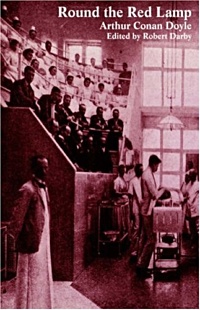 There was little scandal about this singular domestic incident. The Professor had few personal friends, and seldom went into society. His marriage had been so quiet that most of his colleagues had never ceased to regard him as a bachelor. Mrs. Esdaile and a few others might talk, but their field for gossip was limited, for they could only guess vaguely at the cause of this sudden separation.
There was little scandal about this singular domestic incident. The Professor had few personal friends, and seldom went into society. His marriage had been so quiet that most of his colleagues had never ceased to regard him as a bachelor. Mrs. Esdaile and a few others might talk, but their field for gossip was limited, for they could only guess vaguely at the cause of this sudden separation.
The Professor was as punctual as ever at his classes, and as zealous in directing the laboratory work of those who studied under him. His own private researches were pushed on with feverish energy. It was no uncommon thing for his servants, when they came down of a morning, to hear the shrill scratchings of his tireless pen, or to meet him on the staircase as he ascended, grey and silent, to his room. In vain his friends assured him that such a life must undermine his health. He lengthened his hours until day and night were one long, ceaseless task.
Gradually under this discipline a change came over his appearance. His features, always inclined to gauntness, became even sharper and more pronounced. There were deep lines about his temples and across his brow. His cheek was sunken and his complexion bloodless. His knees gave under him when he walked; and once when passing out of his lecture-room he fell and had to be assisted to his carriage.
This was just before the end of the session and soon after the holidays commenced the professors who still remained in Birchespool were shocked to hear that their brother of the chair of physiology had sunk so low that no hopes could be entertained of his recovery. Two eminent physicians had consulted over his case without being able to give a name to the affection from which he suffered. A steadily decreasing vitality appeared to be the only symptom—a bodily weakness which left the mind unclouded. He was much interested himself in his own case, and made notes of his subjective sensations as an aid to diagnosis. Of his approaching end he spoke in his usual unemotional and somewhat pedantic fashion. “It is the assertion,” he said, “of the liberty of the individual cell as opposed to the cell-commune. It is the dissolution of a co-operative society. The process is one of great interest.”
And so one grey morning his co-operative society dissolved. Very quietly and softly he sank into his eternal sleep. His two physicians felt some slight embarrassment when called upon to fill in his certificate.
“It is difficult to give it a name,” said one.
“Very,” said the other.
“If he were not such an unemotional man, I should have said that he had died from some sudden nervous shock—from, in fact, what the vulgar would call a broken heart.”
“I don’t think poor Grey was that sort of a man at all.”
“Let us call it cardiac, anyhow,” said the older physician.
So they did so.
Sir Arthur Conan Doyle (1859 – 1930)
Round the Red Lamp: Being Facts and Fancies of Medical Life
Physiologist’s Wife (#08)
fleursdumal.nl magazine
More in: Doyle, Arthur Conan, Doyle, Arthur Conan, DRUGS & DISEASE & MEDICINE & LITERATURE, Round the Red Lamp
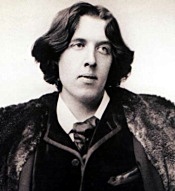
Oscar Wilde
(1854 – 1900)
Le Jardin Des Tuileries
This winter air is keen and cold,
And keen and cold this winter sun,
But round my chair the children run
Like little things of dancing gold.
Sometimes about the painted kiosk
The mimic soldiers strut and stride,
Sometimes the blue-eyed brigands hide
In the bleak tangles of the bosk.
And sometimes, while the old nurse cons
Her book, they steal across the square,
And launch their paper navies where
Huge Triton writhes in greenish bronze.
And now in mimic flight they flee,
And now they rush, a boisterous band –
And, tiny hand on tiny hand,
Climb up the black and leafless tree.
Ah! cruel tree! if I were you,
And children climbed me, for their sake
Though it be winter I would break
Into spring blossoms white and blue!
Oscar Wilde
fleursdumal.nl magazine
More in: Archive W-X, Wilde, Oscar, Wilde, Oscar
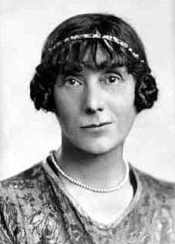
Jessie Pope
(1868 – 1941)
The Zeppelin Armada
‘To-Day, since Zeppelins are in the air,
And folks glance skywards as they go their ways,
Let us hark back a bit to an affair
That happened in Queen Bess’s sturdy days,
When the Armada, backed by Spanish lust
A fleet that floating palaces resembled
Sailed proudly forth to crush us in the dust,
While all the tremulous in England trembled.
What was the fate of those unwieldy craft ?
Our little frigates made of British oak
Harassed the mighty galleons fore and aft,
Handy to strike and shun the counterstroke.
The Great Invasion ended in defeat.
No more could Philip play the part of mocker,
The rout of the Armada was complete,
And down it went to Davy Jones’s locker.
What frigates did in 1558
May be repeated in the air to-day,
When clumsy Zeppelins may meet their fate
From aeroplanes that sting and dart away.
A well-equipped and handy air patrol
Would circumvent an aerial attack.
If London is to be the Zeppes’ goal,
It’s up to us to see they don’t go back!
Jessie Pope
fleursdumal.nl magazine
More in: *War Poetry Archive, Archive O-P, CLASSIC POETRY, WAR & PEACE
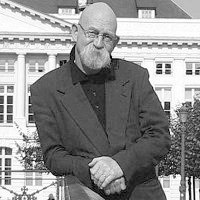
Bachten de Kupe
Je kunt wel putten in de aarde vloeken
omdat gebeden schaars zijn en schuren
als zand, maar beter is het trots te zijn
omdat je ergens gebleven bent. Waar je
dolend wakker kunt worden uit gemelijk
genot, geschaakte dromen, verzakende
grenzen. Waar je een vogel van vele lentes
herkent als jezelf. Toen ik ontwaakte wist
ik loepzuiver weer hoe gisteren voor me
een meisje huppelend riep: “Een olm is
een iep! Een olm is een iep! Een olm is
een iep!” Het is hier niet druk, maar kijk:
hier loopt niet ieder in zijn eigen ochtend.
Bert Bevers
Bert Bevers, gedichten
fleursdumal.nl magazine
More in: Archive A-B, Bevers, Bert
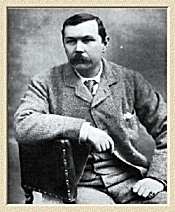 Sweethearts
Sweethearts
by Arthur Conan Doyle
It is hard for the general practitioner who sits among his patients both morning and evening, and sees them in their homes between, to steal time for one little daily breath of cleanly air. To win it he must slip early from his bed and walk out between shuttered shops when it is chill but very clear, and all things are sharply outlined, as in a frost. It is an hour that has a charm of its own, when, but for a postman or a milkman, one has the pavement to oneself, and even the most common thing takes an ever-recurring freshness, as though causeway, and lamp, and signboard had all wakened to the new day. Then even an inland city may seem beautiful, and bear virtue in its smoke-tainted air.
But it was by the sea that I lived, in a town that was unlovely enough were it not for its glorious neighbour. And who cares for the town when one can sit on the bench at the headland, and look out over the huge, blue bay, and the yellow scimitar that curves before it. I loved it when its great face was freckled with the fishing boats, and I loved it when the big ships went past, far out, a little hillock of white and no hull, with topsails curved like a bodice, so stately and demure. But most of all I loved it when no trace of man marred the majesty of Nature, and when the sun-bursts slanted down on it from between the drifting rainclouds. Then I have seen the further edge draped in the gauze of the driving rain, with its thin grey shading under the slow clouds, while my headland was golden, and the sun gleamed upon the breakers and struck deep through the green waves beyond, showing up the purple patches where the beds of seaweed are lying. Such a morning as that, with the wind in his hair, and the spray on his lips, and the cry of the eddying gulls in his ear, may send a man back braced afresh to the reek of a sick-room, and the dead, drab weariness of practice.
It was on such another day that I first saw my old man. He came to my bench just as I was leaving it. My eye must have picked him out even in a crowded street, for he was a man of large frame and fine presence, with something of distinction in the set of his lip and the poise of his head. He limped up the winding path leaning heavily upon his stick, as though those great shoulders had become too much at last for the failing limbs that bore them. As he approached, my eyes caught Nature’s danger signal, that faint bluish tinge in nose and lip which tells of a labouring heart.
“The brae is a little trying, sir,” said I. “Speaking as a physician, I should say that you would do well to rest here before you go further.”
He inclined his head in a stately, old-world fashion, and seated himself upon the bench. Seeing that he had no wish to speak I was silent also, but I could not help watching him out of the corners of my eyes, for he was such a wonderful survival of the early half of the century, with his low-crowned, curly-brimmed hat, his black satin tie which fastened with a buckle at the back, and, above all, his large, fleshy, clean-shaven face shot with its mesh of wrinkles. Those eyes, ere they had grown dim, had looked out from the box-seat of mail coaches, and had seen the knots of navvies as they toiled on the brown embankments. Those lips had smiled over the first numbers of “Pickwick,” and had gossiped of the promising young man who wrote them. The face itself was a seventy-year almanack, and every seam an entry upon it where public as well as private sorrow left its trace. That pucker on the forehead stood for the Mutiny, perhaps; that line of care for the Crimean winter, it may be; and that last little sheaf of wrinkles, as my fancy hoped, for the death of Gordon. And so, as I dreamed in my foolish way, the old gentleman with the shining stock was gone, and it was seventy years of a great nation’s life that took shape before me on the headland in the morning.
But he soon brought me back to earth again. As he recovered his breath he took a letter out of his pocket, and, putting on a pair of horn-rimmed eye-glasses, he read it through very carefully. Without any design of playing the spy I could not help observing that it was in a woman’s hand. When he had finished it he read it again, and then sat with the corners of his mouth drawn down and his eyes staring vacantly out over the bay, the most forlorn-looking old gentleman that ever I have seen. All that is kindly within me was set stirring by that wistful face, but I knew that he was in no humour for talk, and so, at last, with my breakfast and my patients calling me, I left him on the bench and started for home.
I never gave him another thought until the next morning, when, at the same hour, he turned up upon the headland, and shared the bench which I had been accustomed to look upon as my own. He bowed again before sitting down, but was no more inclined than formerly to enter into conversation. There had been a change in him during the last twenty-four hours, and all for the worse. The face seemed more heavy and more wrinkled, while that ominous venous tinge was more pronounced as he panted up the hill. The clean lines of his cheek and chin were marred by a day’s growth of grey stubble, and his large, shapely head had lost something of the brave carriage which had struck me when first I glanced at him. He had a letter there, the same, or another, but still in a woman’s hand, and over this he was moping and mumbling in his senile fashion, with his brow puckered, and the corners of his mouth drawn down like those of a fretting child. So I left him, with a vague wonder as to who he might be, and why a single spring day should have wrought such a change upon him.
So interested was I that next morning I was on the look out for him. Sure enough, at the same hour, I saw him coming up the hill; but very slowly, with a bent back and a heavy head. It was shocking to me to see the change in him as he approached.
“I am afraid that our air does not agree with you, sir,” I ventured to remark.
But it was as though he had no heart for talk. He tried, as I thought, to make some fitting reply, but it slurred off into a mumble and silence. How bent and weak and old he seemed—ten years older at the least than when first I had seen him! It went to my heart to see this fine old fellow wasting away before my eyes. There was the eternal letter which he unfolded with his shaking fingers. Who was this woman whose words moved him so? Some daughter, perhaps, or granddaughter, who should have been the light of his home instead of—— I smiled to find how bitter I was growing, and how swiftly I was weaving a romance round an unshaven old man and his correspondence. Yet all day he lingered in my mind, and I had fitful glimpses of those two trembling, blue-veined, knuckly hands with the paper rustling between them.
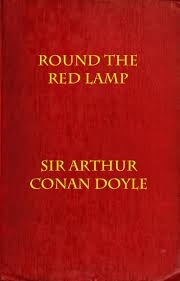 I had hardly hoped to see him again. Another day’s decline must, I thought, hold him to his room, if not to his bed. Great, then, was my surprise when, as I approached my bench, I saw that he was already there. But as I came up to him I could scarce be sure that it was indeed the same man. There were the curly-brimmed hat, and the shining stock, and the horn glasses, but where were the stoop and the grey-stubbled, pitiable face? He was clean-shaven and firm lipped, with a bright eye and a head that poised itself upon his great shoulders like an eagle on a rock. His back was as straight and square as a grenadier’s, and he switched at the pebbles with his stick in his exuberant vitality. In the button-hole of his well-brushed black coat there glinted a golden blossom, and the corner of a dainty red silk handkerchief lapped over from his breast pocket. He might have been the eldest son of the weary creature who had sat there the morning before.
I had hardly hoped to see him again. Another day’s decline must, I thought, hold him to his room, if not to his bed. Great, then, was my surprise when, as I approached my bench, I saw that he was already there. But as I came up to him I could scarce be sure that it was indeed the same man. There were the curly-brimmed hat, and the shining stock, and the horn glasses, but where were the stoop and the grey-stubbled, pitiable face? He was clean-shaven and firm lipped, with a bright eye and a head that poised itself upon his great shoulders like an eagle on a rock. His back was as straight and square as a grenadier’s, and he switched at the pebbles with his stick in his exuberant vitality. In the button-hole of his well-brushed black coat there glinted a golden blossom, and the corner of a dainty red silk handkerchief lapped over from his breast pocket. He might have been the eldest son of the weary creature who had sat there the morning before.
“Good morning, Sir, good morning!” he cried with a merry waggle of his cane.
“Good morning!” I answered, “how beautiful the bay is looking.”
“Yes, Sir, but you should have seen it just before the sun rose.”
“What, have you been here since then?”
“I was here when there was scarce light to see the path.”
“You are a very early riser.”
“On occasion, sir; on occasion!” He cocked his eye at me as if to gauge whether I were worthy of his confidence. “The fact is, sir, that my wife is coming back to me to day.”
I suppose that my face showed that I did not quite see the force of the explanation. My eyes, too, may have given him assurance of sympathy, for he moved quite close to me and began speaking in a low, confidential voice, as if the matter were of such weight that even the sea-gulls must be kept out of our councils.
“Are you a married man, Sir?”
“No, I am not.”
“Ah, then you cannot quite understand it. My wife and I have been married for nearly fifty years, and we have never been parted, never at all, until now.”
“Was it for long?” I asked.
“Yes, sir. This is the fourth day. She had to go to Scotland. A matter of duty, you understand, and the doctors would not let me go. Not that I would have allowed them to stop me, but she was on their side. Now, thank God! it is over, and she may be here at any moment.”
“Here!”
“Yes, here. This headland and bench were old friends of ours thirty years ago. The people with whom we stay are not, to tell the truth, very congenial, and we have, little privacy among them. That is why we prefer to meet here. I could not be sure which train would bring her, but if she had come by the very earliest she would have found me waiting.”
“In that case——” said I, rising.
“No, sir, no,” he entreated, “I beg that you will stay. It does not weary you, this domestic talk of mine?”
“On the contrary.”
“I have been so driven inwards during these few last days! Ah, what a nightmare it has been! Perhaps it may seem strange to you that an old fellow like me should feel like this.”
“It is charming.”
“No credit to me, sir! There’s not a man on this planet but would feel the same if he had the good fortune to be married to such a woman. Perhaps, because you see me like this, and hear me speak of our long life together, you conceive that she is old, too.”
He laughed heartily, and his eyes twinkled at the humour of the idea.
“She’s one of those women, you know, who have youth in their hearts, and so it can never be very far from their faces. To me she’s just as she was when she first took my hand in hers in ‘45. A wee little bit stouter, perhaps, but then, if she had a fault as a girl, it was that she was a shade too slender. She was above me in station, you know—I a clerk, and she the daughter of my employer. Oh! it was quite a romance, I give you my word, and I won her; and, somehow, I have never got over the freshness and the wonder of it. To think that that sweet, lovely girl has walked by my side all through life, and that I have been able——”
He stopped suddenly, and I glanced round at him in surprise. He was shaking all over, in every fibre of his great body. His hands were clawing at the woodwork, and his feet shuffling on the gravel. I saw what it was. He was trying to rise, but was so excited that he could not. I half extended my hand, but a higher courtesy constrained me to draw it back again and turn my face to the sea. An instant afterwards he was up and hurrying down the path.
A woman was coming towards us. She was quite close before he had seen her—thirty yards at the utmost. I know not if she had ever been as he described her, or whether it was but some ideal which he carried in his brain. The person upon whom I looked was tall, it is true, but she was thick and shapeless, with a ruddy, full-blown face, and a skirt grotesquely gathered up. There was a green ribbon in her hat, which jarred upon my eyes, and her blouse-like bodice was full and clumsy. And this was the lovely girl, the ever youthful! My heart sank as I thought how little such a woman might appreciate him, how unworthy she might be of his love.
She came up the path in her solid way, while he staggered along to meet her. Then, as they came together, looking discreetly out of the furthest corner of my eye, I saw that he put out both his hands, while she, shrinking from a public caress, took one of them in hers and shook it. As she did so I saw her face, and I was easy in my mind for my old man. God grant that when this hand is shaking, and when this back is bowed, a woman’s eyes may look so into mine.
Sir Arthur Conan Doyle (1859 – 1930)
Round the Red Lamp: Being Facts and Fancies of Medical Life
Sweethearts (#07)
fleursdumal.nl magazine
More in: Doyle, Arthur Conan, Doyle, Arthur Conan, DRUGS & DISEASE & MEDICINE & LITERATURE, Round the Red Lamp
Thank you for reading Fleurs du Mal - magazine for art & literature